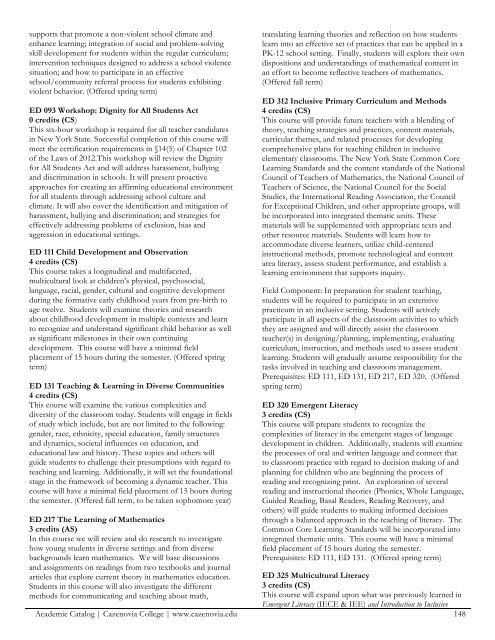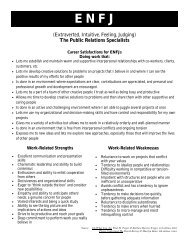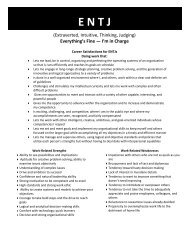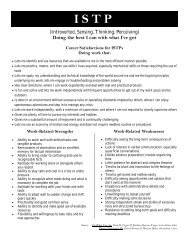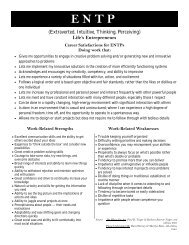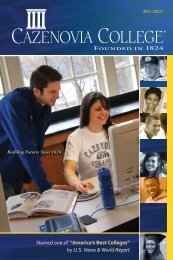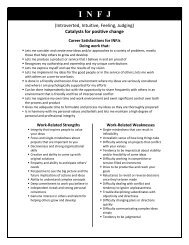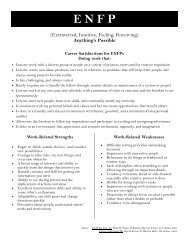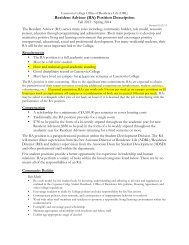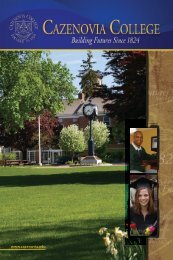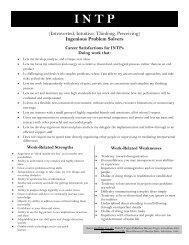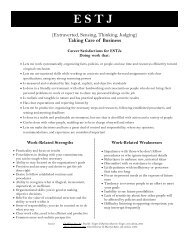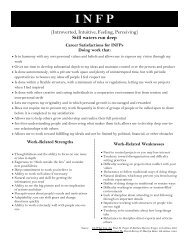of
2013-14 Academic Catalog - Cazenovia College
2013-14 Academic Catalog - Cazenovia College
- No tags were found...
You also want an ePaper? Increase the reach of your titles
YUMPU automatically turns print PDFs into web optimized ePapers that Google loves.
supports that promote a non-violent school climate and<br />
enhance learning; integration <strong>of</strong> social and problem-solving<br />
skill development for students within the regular curriculum;<br />
intervention techniques designed to address a school violence<br />
situation; and how to participate in an effective<br />
school/community referral process for students exhibiting<br />
violent behavior. (Offered spring term)<br />
ED 093 Workshop: Dignity for All Students Act<br />
0 credits (CS)<br />
This six-hour workshop is required for all teacher candidates<br />
in New York State. Successful completion <strong>of</strong> this course will<br />
meet the certification requirements in §14(5) <strong>of</strong> Chapter 102<br />
<strong>of</strong> the Laws <strong>of</strong> 2012.This workshop will review the Dignity<br />
for All Students Act and will address harassment, bullying<br />
and discrimination in schools. It will present proactive<br />
approaches for creating an affirming educational environment<br />
for all students through addressing school culture and<br />
climate. It will also cover the identification and mitigation <strong>of</strong><br />
harassment, bullying and discrimination; and strategies for<br />
effectively addressing problems <strong>of</strong> exclusion, bias and<br />
aggression in educational settings.<br />
ED 111 Child Development and Observation<br />
4 credits (CS)<br />
This course takes a longitudinal and multifaceted,<br />
multicultural look at children’s physical, psychosocial,<br />
language, racial, gender, cultural and cognitive development<br />
during the formative early childhood years from pre-birth to<br />
age twelve. Students will examine theories and research<br />
about childhood development in multiple contexts and learn<br />
to recognize and understand significant child behavior as well<br />
as significant milestones in their own continuing<br />
development. This course will have a minimal field<br />
placement <strong>of</strong> 15 hours during the semester. (Offered spring<br />
term)<br />
ED 131 Teaching & Learning in Diverse Communities<br />
4 credits (CS)<br />
This course will examine the various complexities and<br />
diversity <strong>of</strong> the classroom today. Students will engage in fields<br />
<strong>of</strong> study which include, but are not limited to the following:<br />
gender, race, ethnicity, special education, family structures<br />
and dynamics, societal influences on education, and<br />
educational law and history. These topics and others will<br />
guide students to challenge their presumptions with regard to<br />
teaching and learning. Additionally, it will set the foundational<br />
stage in the framework <strong>of</strong> becoming a dynamic teacher. This<br />
course will have a minimal field placement <strong>of</strong> 15 hours during<br />
the semester. (Offered fall term, to be taken sophomore year)<br />
translating learning theories and reflection on how students<br />
learn into an effective set <strong>of</strong> practices that can be applied in a<br />
PK-12 school setting. Finally, students will explore their own<br />
dispositions and understandings <strong>of</strong> mathematical content in<br />
an effort to become reflective teachers <strong>of</strong> mathematics.<br />
(Offered fall term)<br />
ED 312 Inclusive Primary Curriculum and Methods<br />
4 credits (CS)<br />
This course will provide future teachers with a blending <strong>of</strong><br />
theory, teaching strategies and practices, content materials,<br />
curricular themes, and related processes for developing<br />
comprehensive plans for teaching children in inclusive<br />
elementary classrooms. The New York State Common Core<br />
Learning Standards and the content standards <strong>of</strong> the National<br />
Council <strong>of</strong> Teachers <strong>of</strong> Mathematics, the National Council <strong>of</strong><br />
Teachers <strong>of</strong> Science, the National Council for the Social<br />
Studies, the International Reading Association, the Council<br />
for Exceptional Children, and other appropriate groups, will<br />
be incorporated into integrated thematic units. These<br />
materials will be supplemented with appropriate texts and<br />
other resource materials. Students will learn how to<br />
accommodate diverse learners, utilize child-centered<br />
instructional methods, promote technological and content<br />
area literacy, assess student performance, and establish a<br />
learning environment that supports inquiry.<br />
Field Component: In preparation for student teaching,<br />
students will be required to participate in an extensive<br />
practicum in an inclusive setting. Students will actively<br />
participate in all aspects <strong>of</strong> the classroom activities to which<br />
they are assigned and will directly assist the classroom<br />
teacher(s) in designing/planning, implementing, evaluating<br />
curriculum, instruction, and methods used to assess student<br />
learning. Students will gradually assume responsibility for the<br />
tasks involved in teaching and classroom management.<br />
Prerequisites: ED 111, ED 131, ED 217, ED 320. (Offered<br />
spring term)<br />
ED 320 Emergent Literacy<br />
3 credits (CS)<br />
This course will prepare students to recognize the<br />
complexities <strong>of</strong> literacy in the emergent stages <strong>of</strong> language<br />
development in children. Additionally, students will examine<br />
the processes <strong>of</strong> oral and written language and connect that<br />
to classroom practice with regard to decision making <strong>of</strong> and<br />
planning for children who are beginning the process <strong>of</strong><br />
reading and recognizing print. An exploration <strong>of</strong> several<br />
reading and instructional theories (Phonics, Whole Language,<br />
Guided Reading, Basal Readers, Reading Recovery, and<br />
others) will guide students to making informed decisions<br />
through a balanced approach in the teaching <strong>of</strong> literacy. The<br />
Common Core Learning Standards will be incorporated into<br />
integrated thematic units. This course will have a minimal<br />
field placement <strong>of</strong> 15 hours during the semester.<br />
Prerequisites: ED 111, ED 131. (Offered spring term)<br />
ED 217 The Learning <strong>of</strong> Mathematics<br />
3 credits (AS)<br />
In this course we will review and do research to investigate<br />
how young students in diverse settings and from diverse<br />
backgrounds learn mathematics. We will base discussions<br />
and assignments on readings from two textbooks and journal<br />
articles that explore current theory in mathematics education. ED 325 Multicultural Literacy<br />
Students in this course will also investigate the different<br />
3 credits (CS)<br />
methods for communicating and teaching about math,<br />
This course will expand upon what was previously learned in<br />
Emergent Literacy (IECE & IEE) and Introduction to Inclusive<br />
Academic Catalog | Cazenovia College | www.cazenovia.edu 148


